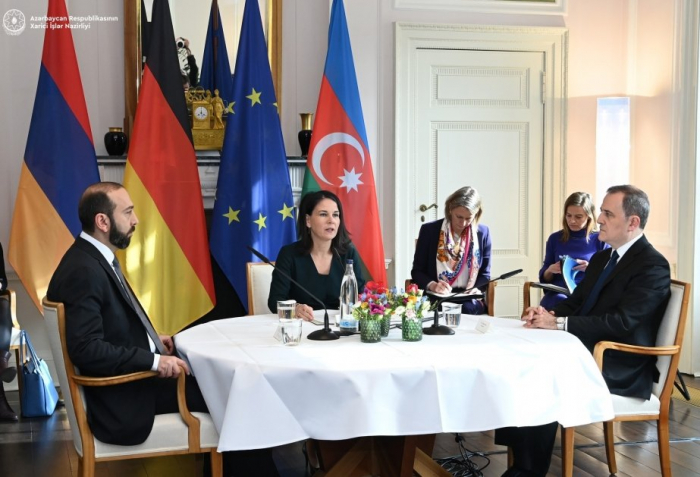On 28-29 February, the foreign ministers of Azerbaijan and Armenia, Jeyhun Bayramov and Ararat Mirzoyan, held the latest round of peace talks in Berlin, Germany. The sides had agreed to hold this ministerial meeting at the earlier meeting of their leaders, which was held at the initiative of Germany’s Chancellor Olaf Scholz on the sidelines of the Munich Security Conference on 17 February.
The very fact that the leaders of the two countries continue the dialogue and reaffirm their willingness to peacefully resolve the remaining issues is indeed extremely important for regional peace and security in the South Caucasus. Nevertheless, the foreign ministers’ meeting in Berlin demonstrated that their peace talks have encountered some significant challenges, resulting in a stalemate. Despite initial optimism expressed by both sides over the past two years regarding the possibility of swiftly reaching a peace agreement, recent developments suggest a diminishing of that optimism, with little to no substantial progress reported.
The challenges that undermine the peace talks are related to the intricate fate of the land passage between western regions of Azerbaijan and its Nakhchivan exclave (sometimes called the Zangezur corridor), the territorial claims against Azerbaijan in the constitutional documents of Armenia, Baku’s recently declared position not to sign a peace treaty unless Armenia changes its constitution, and growingly contradictory positions of the two countries concerning the delimitation process and the border villages each side claims to be under the occupation of the other side. While the former issues are more complicated and hold geopolitical dimensions, the two sides looked previously to be more on the same page regarding the fate of border villages and only recently grew more confrontational.
The claims by Armenian leaders concerning the existence of more than 30 villages of Armenia under the control of Azerbaijan, that started to be made more loudly, have added further negativity to the already tense situation. While the Armenian prime minister Nikol Pashinyan has earlier confirmed the existence of Azerbaijani enclaves under the control of his country, Baku vehemently rejects the claims about more than 30 villages. The intensification of this dispute over the past month shows that the latest meeting of the delimitation commissions in late January has not made major progress in this direction. Apparently, neither the talks in Munich nor in Berlin changed the situation for the better.
Thus, it appears that we are in another deadlock in the Armenia-Azerbaijan peace process. However, unlike the “deadlocks” of the earlier periods, the present one seems to be based on, what Azerbaijani officials call, “de-facto peace”. With the exception of a border incident in early February, the Armenia-Azerbaijan border has remained tranquil since the one-day war in September 2023. Such sustained calm is nearly unprecedented since the dissolution of the Soviet Union, facilitated by mutual verbal recognition of each other's territorial integrity by both parties.
Despite fearmongering campaigns by some political groups in Armenia and in the West, Azerbaijan’s leadership vehemently rejects any plans for the use of force against Armenia for the opening of the Zangezur corridor. In his meeting with Germany’s business delegation in Baku, President Ilham Aliyev reaffirmed this position and criticized French President Emmanuel Macron and EU’s High Representative Josep Borrel for disseminating ungrounded claims about Azerbaijan’s intentions. “Borrell stated that if Azerbaijan were to attack Armenia, it would face dire consequences. Firstly, where did Borrell obtain this information suggesting that Azerbaijan is planning to attack Armenia? We have no such plans. These are mere insinuations by Mr. Macron”, Aliyev stressed.
Hence, the current "de facto peace" situation represents a constructive phase in Armenia-Azerbaijan relations, offering a promising foundation for formalizing peace, namely through the signing of a peace agreement. Occasional meetings between official representatives of both nations, along with expert-level interactions, play a vital role in fostering mutual understanding and addressing lingering disputes.
However, the period leading up to the peace treaty and eventual "de jure peace" between the two countries may extend longer than anticipated. Present challenges, especially those with geopolitical dimensions (e.g., the Zangezur corridor), require more than just political will from Baku and Yerevan. This complexity is compounded by the anti-Russian statements of the Armenian government. We have reached a juncture where it seems more advantageous for the two South Caucasian republics to adopt a cautious approach and observe how the broader geopolitical confrontation between the West and Russia, as well as the ongoing war in Ukraine, unfold, rather than hastily committing to a course of action with uncertain future outcomes.
In summary, the recent Berlin meeting of the foreign ministers has underscored the persistent stalemate in the Armenia-Azerbaijan peace process. Despite ongoing dialogue and expressed intentions for peaceful resolution by the leaders of both nations, substantial challenges undermine progress towards a formal peace agreement. The intricacies surrounding the Zangezur corridor, constitutional disputes, the divergence in positions concerning border villages, and, in a more destructive form, the geopolitical aspects of these disputes have contributed to the impasse. Despite previous optimism, recent developments suggest a dwindling of prospects for immediate breakthroughs in the peace talks. However, amidst this deadlock, there exists a notable silver lining in the form of the “de facto peace” currently prevailing between Armenia and Azerbaijan. This period of relative calm, especially since the one-day war in September 2023, presents an unprecedented opportunity for stability in the region. Despite challenges, it is imperative for both nations to maintain diplomatic channels and engage in constructive dialogue to preserve the present stability and address lingering disputes.
AzVision.az
More about:
















































